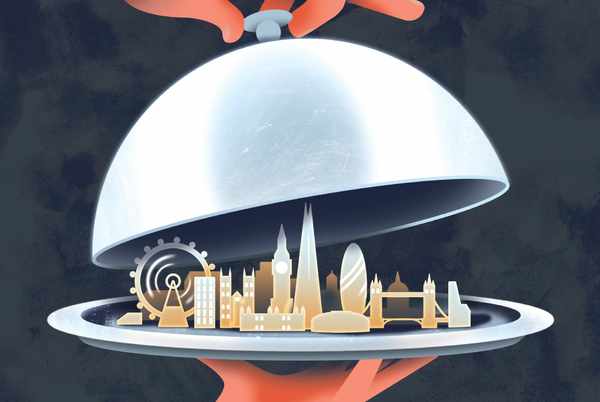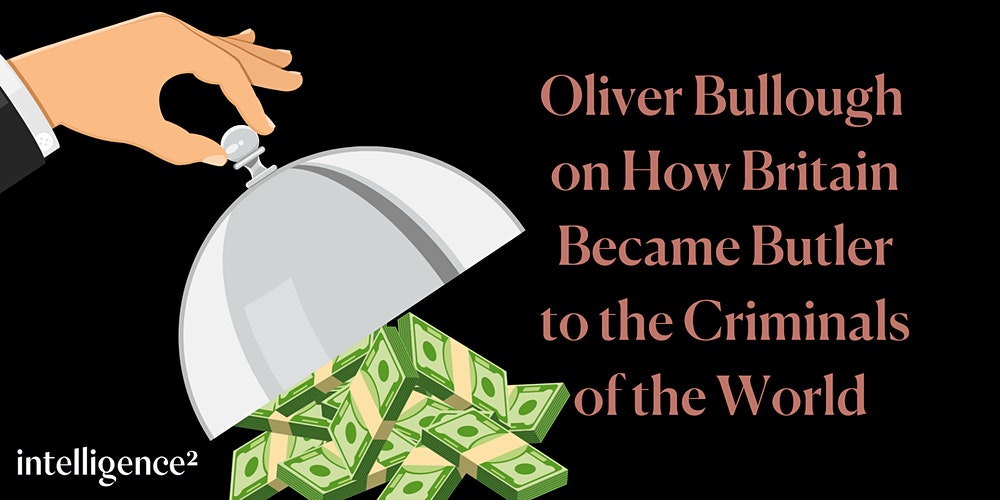
Photo: Via The Guardian
‘Money corrupts the process of reasoning.’- Roy L. Furman, Professor of Law and Leadership, Harvard Law School
Paraphrasing the wise words of Lord Acton about power, I can say: Money Corrupts and Loads of Money Corrupts Absolutely
“In London, money rules everyone. Anyone and anything can be bought.”- A Russian Oligarch on why he loves London!
How the British upper class came to serve the global elite*
By Andy Beckett Via The Guardian
‘From banking to boarding schools, the British establishment has long been at their service, discretion guaranteed.’
‘Other secretive countries, such as Switzerland, have been doing it for longer. Yet Britain has offered oligarchs an unusually broad range of opportunities, from the chance to own famous football clubs to money laundering through prestige property; from private education for their children to a ruling party that isn’t squeamish about who funds it.’

Illustration by Thomas Pullin/ The Guardian
‘Who better to understand the needs of global capitalism’s mega-rich than Britons who grew up with staff themselves?’
‘Britain is good at wealth. Not necessarily at generating it, or distributing it in ways that make a contented society, but at looking after it, helping it grow and making it respectable – converting it into social and cultural capital. For centuries, British bankers, lawyers, accountants and other assistants to the wealthy have discreetly performed these roles.
Their customers used to be mostly British: slave traders, self-made industrialists, people who had extracted fortunes from our colonies. But in recent decades, foreigners have become the main beneficiaries of Britain’s readiness to serve the rich regardless of how they made their money. So significant is this change that Britain has become “butler to the world”, according to a persuasive new book by the anti-corruption campaigner and journalist Oliver Bullough.
Other secretive countries, such as Switzerland, have been doing it for longer. Yet Britain has offered oligarchs an unusually broad range of opportunities, from the chance to own famous football clubs to money laundering through prestige property; from private educations for their children to a ruling party that isn’t squeamish about who funds it.
The economic crime bill, finally going through parliament after years of delays, may reduce this activity: by requiring that foreign owners of land and property be more clearly identified, and by making investigations easier into those with “unexplained wealth”. Sanctions against some Russian oligarchs after the invasion of Ukraine are bringing parts of Londongrad to an abrupt halt. But Bullough says these belated measures don’t go nearly far enough. Meanwhile the capital and the plushest home counties suburbs will go on servicing plutocrats from elsewhere.
For a country that was a superpower less than a lifetime ago, being a butler to the elites of other countries that have overtaken it seems quite a drop in status. In 2007, the social commentators Peter York and Olivia Stewart-Liberty described the increasing number of companies set up by posh English people to ease the lives of the super-rich – such as Quintessentially, co-founded by Ben Elliot, nephew of the Duchess of Cornwall and now Conservative party co-chairman – as a “master-turned-servant” phenomenon. The same could be said of older British institutions such as the City of London, which used to finance the British empire but now largely works for its successors.

Britain Has Become a Sinking Ship of Systemic Corruption, Cronyism and Chumocracy
How have our elites managed to adjust to and rationalise this switch in roles? One obvious answer is that working for foreign tycoons can be very profitable. A more counterintuitive explanation is that running an empire and organising things for rich clients require some of the same qualities: confidence, good contacts and a belief in hierarchy as the natural state of the world. As global capitalism has created ever more privileged winners, who better to understand their needs than Britons who grew up with staff themselves?
You could also see in this aristocratic entrepreneurialism a final victory for Thatcherism. Long after the British working class and middle class, at least some of the upper class have got used to selling themselves. They don’t “have the old inhibitions about being pushy”, York and Stewart-Liberty wrote. With the new foreign money making life in London more expensive, the upper classes “can’t afford that old false modesty”.
Serving the international super-rich can also be a way of escaping Britain. In 1973, the historian Jan Morris identified among British imperialists “a recurrent yearning to break out” of these islands “into more vivid places, where fortunes can be made, outrageous enterprises undertaken, and the restrictive rules … disregarded”. In a smaller but similar way, working for an oligarch can make you feel part of a global adventure, close to real power – while leaving Britain’s problems for others to try and solve.
It was in the 1970s, the first decade after the empire’s final dismantling, that London began welcoming Middle Eastern tycoons who wanted to spend, invest and hide their oil money. A new breed of British estate agent, specialising in ultra-expensive property, emerged to cater to them. The growth and polarisation of the Russian, Chinese and Indian economies from the 90s onwards produced further waves of newly wealthy people, looking for business and pleasure in high-status western cities. London successfully sold itself to them as a place of good taste and tradition – and lower taxes than New York or Paris.
Sometimes, this process was seen as part of “the Wimbledon effect”: the idea, named after the tennis tournament, that what matters to the British economy is not the nationality of the competitors, but where the competition happens.
Could post-imperial Britain have chosen to provide different, less morally compromised services to the outside world? Arguably for much of the postwar period it did. From the 60s to the 90s, what Britain primarily sold to foreign visitors was the mass culture made possible by social democracy: innovations in pop music, street fashion and television, subsidised by more generous unemployment benefits, a more confident BBC and free university education.
That vibrant pop culture still exists, but it feels less central to British life and less globally influential. Today, London in particular is known to the world’s wealthy as a place to eat in expensive restaurants, park your supercar outside Harrods and check on your barely used properties and hidden investments. It’s an economic model that works, up to a point, except when geopolitical shocks disturb it. But for those who can’t afford or don’t provide its services, it offers little. If all the oligarchs ever leave, we won’t be mourning.’-*This article by Andy Beckett was first published in the Guardian on 10 March 2022
For all those in Search of Truth: A Must-read Book

Butler to the World
The book the oligarchs don't want you to read - how Britain became the servant of tycoons, tax dodgers, kleptocrats and criminals
Bestselling author Oliver Bullough reveals the scandalous reality of Britain's new position in the world.
‘'A savage analysis of Britain's soul. As essential as Orwell at his best' Peter Pomerantsev 'Horribly brilliant' James O'Brien The Suez Crisis of 1956 was Britain's twentieth-century nadir, the moment when the once superpower was bullied into retreat. In the immortal words of former US Secretary of State Dean Acheson, 'Britain has lost an empire and not yet found a role.' But the funny thing was, Britain had already found a role. It even had the costume. The leaders of the world just hadn't noticed it yet. Butler to the World reveals how the UK took up its position at the elbow of the worst people on Earth: the oligarchs, kleptocrats and gangsters. We pride ourselves on values of fair play and the rule of law, but few countries do more to frustrate global anti-corruption efforts. We are now a nation of Jeeveses, snobbish enablers for rich halfwits of considerably less charm than Bertie Wooster. It doesn't have to be that way.’- Purchase the book HERE
Read more:
How Putin’s Oligarchs Bought London
Gas-powered kingmaker: how the UK welcomed Putin’s man in Ukraine
Inside the £250m Abramovich property portfolio
We claim Britain is an ethical democracy - but oligarchs know that’s not true
Western values? They enthroned the monster who is shelling Ukrainians today
